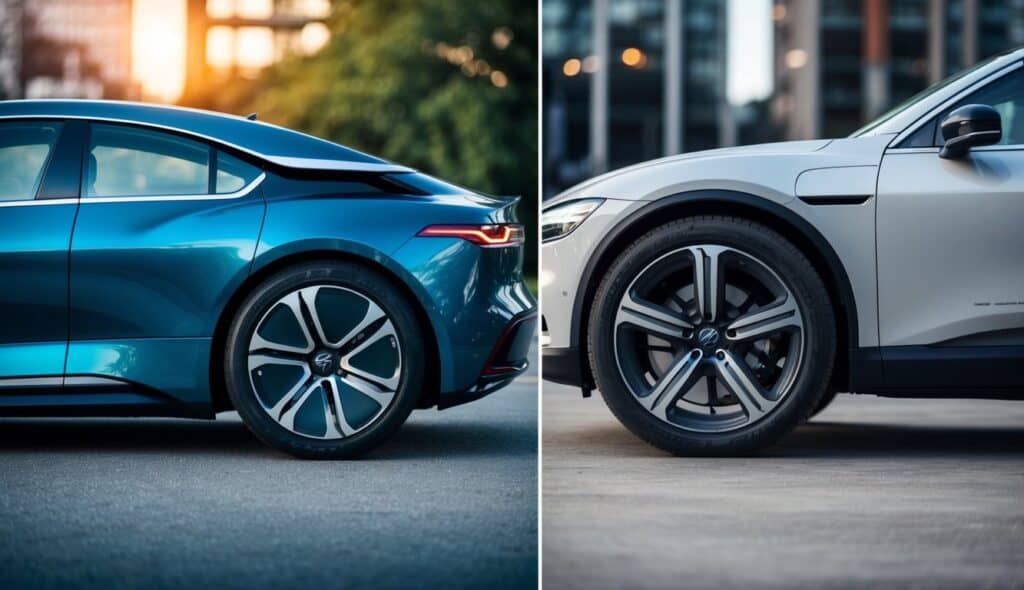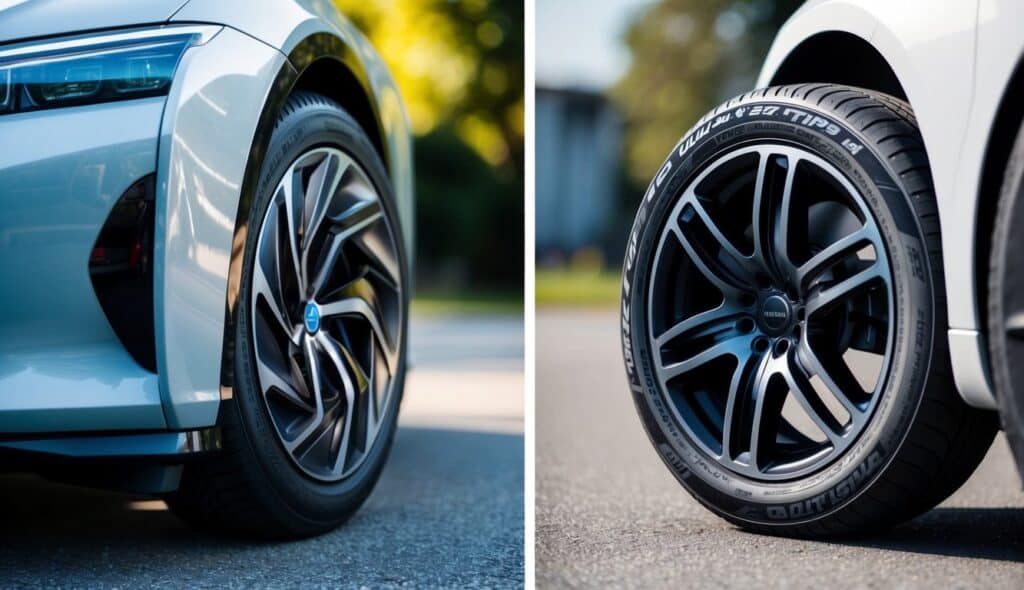As electric vehicles (EVs) become increasingly popular, a lot of attention is being paid to their unique requirements, especially when it comes to tires. While at first glance, tires might seem like a universal component, there are significant differences between those designed for electric cars and those for traditional internal combustion engine (ICE) vehicles. This blog post will delve into these differences, exploring why they matter and what you should consider when choosing tires for your vehicle.
The Basics of Tire Design
Before diving into the specifics of EV and regular tires, it’s essential to understand the basic components and functions of a tire. Tires are designed to provide traction, absorb road shocks, and support the weight of the vehicle. They are made up of several key parts:
- Tread: This is the part of the tire that makes contact with the road. It’s designed to provide grip and channel away water to prevent hydroplaning.
- Sidewall: The side of the tire that provides lateral stability and absorbs impacts.
- Bead: The edge of the tire that ensures it stays attached to the wheel rim.
- Carcass: The internal structure of the tire that gives it strength and flexibility.

Check out Why Electric Cars Are Bad
Key Differences Between EV Tires and Regular Tires
Weight and Load Capacity
One of the most significant differences between EVs and ICE vehicles is weight. Electric vehicles typically weigh more due to the heavy battery packs they carry.
For example, a Tesla Model 3 weighs around 4,000 pounds, while a comparable ICE vehicle like the BMW 3 Series weighs about 3,500 pounds. This additional weight places more stress on the tires, requiring them to have a higher load capacity.
EV-specific tires are designed to handle this extra weight without compromising performance or safety. They often have reinforced sidewalls and stronger internal structures to support the vehicle better.
Rolling Resistance
Rolling resistance refers to the energy lost when a tire rolls over a surface. Lower rolling resistance means better efficiency and longer driving range for EVs. Regular tires are not optimized for low rolling resistance as much as EV tires are.
According to a study by NASA, low-rolling-resistance tires can significantly enhance the efficiency of electric vehicles. These tires are made from special compounds that reduce energy loss, thereby extending the range of the EV.
Noise Reduction
Electric vehicles are quieter than ICE vehicles because they lack a noisy engine. This makes tire noise more noticeable. EV tires are designed to minimize this noise. For instance, a study by Sandia Labs found that tire noise is a major source of sound in EVs, leading manufacturers to develop quieter tires through advanced tread patterns and noise-reducing materials.
Durability and Wear
The higher torque of electric motors can cause tires to wear out faster. EVs can deliver instant torque, which can be tough on tires.
According to a report by BARC, this can lead to quicker tire wear compared to regular vehicles. EV tires are designed with more durable compounds to withstand this increased wear and tear.
Check out Why Do Electric Cars Look So Ugly?
EV Tires vs. Regular Tires
| Feature | EV Tires | Regular Tires |
|---|---|---|
| Weight Support | Higher load capacity for heavier vehicles | Standard load capacity |
| Rolling Resistance | Lower for better efficiency | Higher, not optimized for efficiency |
| Noise Reduction | Designed for minimal noise | Standard noise levels |
| Durability | More durable compounds for high torque | Standard durability |
| Cost | Generally more expensive | Typically cheaper |

Examples of EV-Specific Tires
Michelin Pilot Sport EV
Michelin’s Pilot Sport EV is designed specifically for electric sports cars. It offers low rolling resistance, high load capacity, and reduced noise levels. The tire uses Michelin’s Green X technology, which improves energy efficiency and extends the vehicle’s range.
Continental EcoContact 6
The Continental EcoContact 6 is another excellent option for EVs. It features low rolling resistance and a special tread design that reduces noise. The tire is also built to handle the extra weight of electric vehicles, making it a reliable choice for EV owners.
Goodyear Assurance WeatherReady
Goodyear’s Assurance WeatherReady tire is designed for all-season performance in electric vehicles. It offers good traction in various weather conditions and has a reinforced structure to support the weight of EVs. The tire also features Goodyear’s Weather Reactive Technology, which adapts to changing road conditions for better performance.
Considerations When Choosing Tires for Your EV
Driving Habits
Your driving habits are crucial in determining the right tires for your EV. Low-rolling-resistance tires will help maximize your range if you frequently drive long distances. All-season or winter tires might be necessary if you drive in areas with harsh weather conditions.
Vehicle Type
Different types of electric vehicles have different requirements. For instance, an electric SUV will need tires with a higher load capacity compared to a compact electric car. Always check the manufacturer’s recommendations for your specific vehicle model.
Cost
While EV-specific tires tend to be more expensive, they offer benefits like improved efficiency, longer range, and better durability. Consider these factors when evaluating the cost of new tires.
Environmental Impact
Choosing tires with lower rolling resistance not only benefits your vehicle’s efficiency but also has a positive impact on the environment. Reduced energy consumption means fewer emissions, even if your EV is charged using non-renewable energy sources.
Check out Does an Electric Car Need Oil?
Future Trends in EV Tire Technology
The tire industry continuously evolves, with new technologies being developed to meet electric vehicles’ unique challenges. Some future trends to watch for include:
Smart Tires
Smart tires equipped with sensors can monitor tire pressure, temperature, and tread wear in real-time. This data can help optimize tire performance and extend their lifespan. Companies like Pirelli are already working on smart tire technologies that can communicate with the vehicle’s onboard systems.
Sustainable Materials
As environmental concerns grow, tire manufacturers are exploring sustainable materials to reduce their ecological footprint. For example, Bridgestone is developing tires made from guayule, a desert shrub that can be used as a natural rubber alternative.
Self-Healing Tires
Imagine a tire that can repair itself after a puncture. This technology is still in its early stages, but researchers are making progress in developing self-healing materials that could revolutionize the tire industry.
Conclusion
The differences between electric car tires and regular tires are significant and have a direct impact on your vehicle’s performance, efficiency, and safety. Understanding these differences is crucial for making an informed decision about choosing the right tires for your EV.
Electric vehicle tires are designed to handle the unique demands of EVs, including higher weight, increased torque, and the need for low rolling resistance. While they may come at a higher cost, the benefits
You may also like:
- Are Electric Vehicles Tires More Expensive?
- Why Do Electric Cars Accelerate Faster Than Gas Cars?
- How to Become an Electric Car Mechanic in UK
- Hybrid Car vs Electric Car
- Do Electric Car Tires Wear Out Faster?

Hi, I’m Marybeth, an electric car enthusiast living in New York in the USA. As the owner of electriccartalks.com, I love sharing my knowledge on EV tips, battery maintenance, and charging solutions. As a proud Tesla owner, I blend my personal experiences with professional insights to offer valuable information to fellow EV enthusiasts. Through my articles, I aim to empower others to make informed decisions about their electric vehicles. Read more